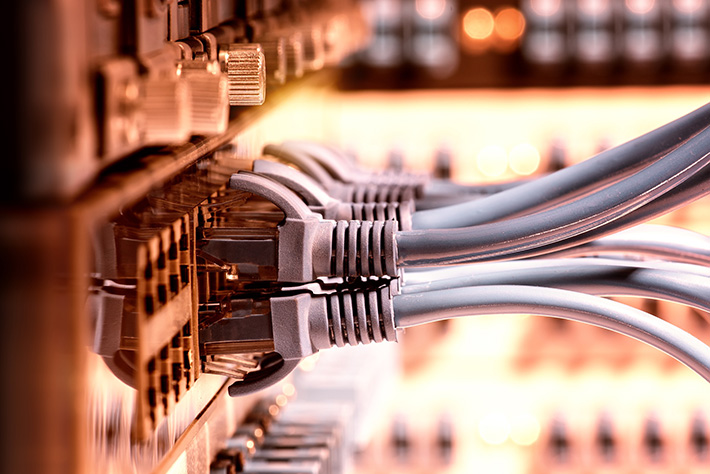Congratulations! Your business is growing, and you need to move locations to handle more production. As you look at options, your commercial real estate agent specifies which buildings feature fiber optic cabling and which have coaxial. Depending on what your business needs are, one may be better suited for your expansion.
So, what is the difference between coaxial and fiber optic cabling?
The biggest difference between these two types is what their core is made of. Coaxial contains copper or aluminum in the center and fiber optic cable has glass or plastic. This contrast in material means they transfer data differently. Coaxial cable is conductive and uses electricity, whereas fiber optics is nonconductive and uses light.
Both types of cables contain layers to separate and protect the signals. Coaxial cables usually have layers of insulation with copper mesh in between, and the fiber optic core is layered by cladding, coating, strengthening fibers, and a jacket.
So, What are the Pros?
There are many pros of fiber optic cables because of their use of light. One of them is how they can transmit a large amount of data in a short amount of time. They are also secure against electromagnetic interference and noise-free, so their transmissions can’t be disrupted and are clear. They can be used for long distances, and are strong, even though a single strand is thinner than human hair.
The pros of coaxial cables start with cost. They are a more affordable form of cabling than other types. Coaxial cables are also durable due to their thickness and are generally easier to install. They can be used in a wide variety of applications and, with proper shielding, are a secure option.
So, What are the Cons?
Fiber optics do have a couple of cons, which begin with the technical expertise needed to install and splice the cables. They are not as easy to set up as coaxial cables. The other disadvantage is cost. Per meter, fiber optic cables are more expensive than their coaxial counterparts.
Coaxial cabling doesn’t have a large bandwidth or long-range before repeaters are needed. Because it uses electrical signals, it can be affected by electromagnetic and radio frequency interference. It is bulkier than other cabling, which can be a disadvantage if size and weight are an issue for installation.
Related Questions
So, What Types of Businesses Are a Good Fit for Fiber Optics?
The bandwidth of fiber optics makes them great for data centers, or any company that handles a large amount of information. They are also a good fit for telecommunications, businesses that need a very secure line that can’t risk interference, and local area networks. Any business that handles lots of sensitive data such as a large medical company or the military would benefit from the advantages of fiber optics.
So, What Types of Companies Do Coaxial Cables Fit Best?
If you don’t need a long cable line, then coaxial cabling could be a great fit. For instance, you have probably seen this type of cabling used for internet, cable TV, or other short-distance communication installations. They are used in cars, medical equipment, and to attach satellites to their receivers. They are more cost-effective and still provide effective service.
Recap
Maybe you have found the perfect new building for your expansion, and it includes both types of cabling. It may feature coaxial cabling for the TVs in the office areas, and fiber optic cabling for networking and internet speed. They can’t be used interchangeably, which is fine because each has its purpose. So, take it as a win that you have both at your disposal, and enjoy your business growth!
In Need of Low Voltage Cabling Products?
Onsite Wire & Cable +Telinks has an extensive inventory available in 2 locations covering the Mid-West and East-Coast to better serve your wire & cable requirements. Our staff is extremely knowledgeable, helpful and dedicated to meeting your low voltage cabling and telecommunication needs. Our products include coaxial, fiber optic, fire alarm, sound and security as well as temperature controls, voice and data. Visit us online for a Quick Quote or speak to an expert about our products, services and pricing!

